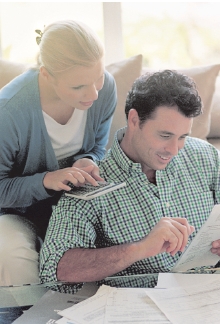Budgeting to buy a home? For many prospective homebuyers, accumulating the cash for a down payment can be daunting. But there are many ways to raise enough money to buy a home. If you want to buy a house, you need to start by making a budget to buy. Do a financial check-up and develop some strategies for saving:
• Set down on paper your monthly income, monthly savings and monthly spending: If you have an overabundance of high-interest credit debt, move your balances to cheaper cards if possible, and plan on spending a year paying down as much of that debt as possible.
• Identify your long-term financial goals: Owning a house may be one, saving enough for retirement may be another.
• Make a home-buying savings plan: Open a savings account just for this purpose and use it religiously, even if you just put aside $20 a week.
• Assess other sources of possible down payment funds, such as an Individual Retirement Account: First-time buyers now have access to $10,000 of these funds penalty-free.
• Cut back on non-essential spending: Your friends and relatives will understand you can’t spend $20 going to dinner and the movies if you say you’re saving to buy a house. Your children will understand, too. In fact, saving to buy a house can become a family activity.
• Make saving for a house fun: Chart your progress on paper and post it somewhere where you can remind yourself of your goal.
20 Ways To Raise A Down Payment
1. Ask your parents, other relatives or friends for help. If they can’t give or loan any money, perhaps they’ll co-sign the loan.
2. Sell other real estate you may own.
3. Sell securities you might own.
4. Sell collectibles or heirlooms you own.
5. Cash in the built-up value of any life insurance your might own.
6. Withdraw money from your Individual Retirement Account. New tax laws make this more attractive, especially if you’re a first-time buyer or haven’t owned a home for the past few years.
7. Borrow against your retirement funds. In some cases, the rate on the loan may be as small as 2 percent
8. Ask for help from your church, synagogue or other nonprofit organization. (Fannie Mae, the big secondary-mortgage market entity, has a “3/2” loan program that allows you to make a 3 percent down payment if a bona fide nonprofit puts down the other 2 percent).
9. Sell a boat or second vehicle you own and use the cash for the down payment.
10. Get a second job. It’ll help you raise cash, and the extra income will improve your chances of qualifying for a loan. You can quit later.
11. Look for an investment partner who’ll put up some or all of the cash in an equity-sharing partnership. You make the monthly payments and the two of you split the eventual resale profits.
12. Change the withholding taxes on your salary in anticipation of higher deductions when you get a mortgage. Your take-home pay will increase, giving you more funds to put toward a down payment.
13. Look for loan programs (VA, USDA, FHA, etc.) that require little or nothing down.
14. Look for a home with an assumable loan. Rather than buying out the owner’s equity, ask the seller to carry back a second mortgage for an equal amount. Result: You buy the home with nothing down.
15. Pawn something you own and use the proceeds for a down payment. You can get the item back later after you’ve moved in and can afford to pay the pawnbroker back. Pawnbrokers rarely report their loans to credit bureaus.
16. Refinance your car or other vehicles and add the proceeds to your down payment. (Check with a lender before doing this, as any new financing can affect your credit score!)
17. Offer something other than cash (a car, boat, collectibles, etc.) to the seller in lieu of a cash down payment.
18. Offer your services/expertise to the seller in lieu of a down payment. Some examples include $10,000 worth of auto services if you’re a mechanic, dental work if you’re a dentist, typing services if you’re a clerk, artwork if you’re an artist or legal work if you’re an attorney.
19. Look for foreclosure properties that require little or no down payment. Some lenders and government agencies will let you buy a foreclosure with a very small down payment if your credit is good, they’re anxious to get the home occupied.
20. Sell crafts you make, or services like babysitting or lawn work, for extra cash.
Save To Own
Once you buy a house, don’t give up your newfound savings discipline. Start an emergency reserve fund. You may need it for home repairs or improvements. And remember, every day you own your home, you are also building equity, a form of savings, too.
Co-sign On The Dotted Line
Many lenders will allow all of the down payment to come from your parents if they co-sign the loan. This does mean that your parents’ names will go on the title. They also will be jointly responsible for mortgage payments. You may eventually be able to refinance the loan in only your name after you have accumulated some equity in the property or improved your financial situation. For more information, consult a real estate attorney.




Leave a Reply